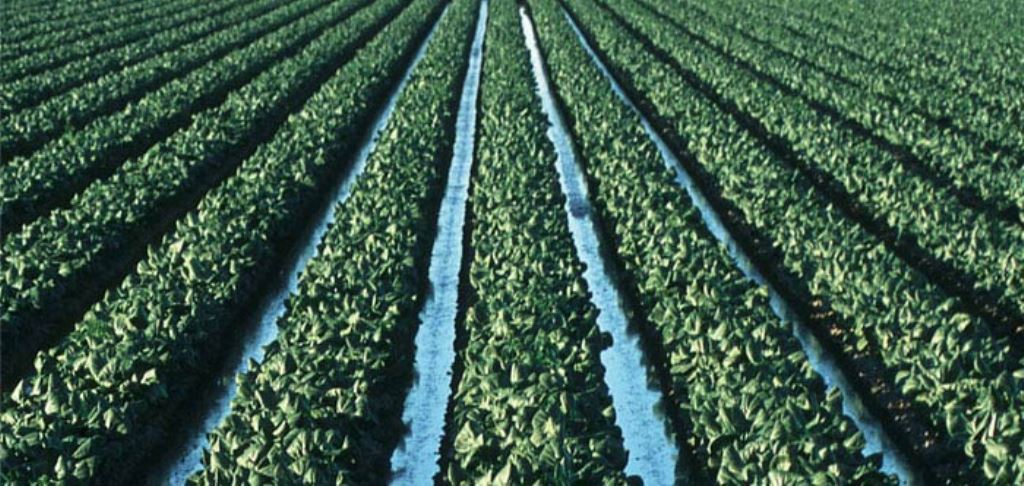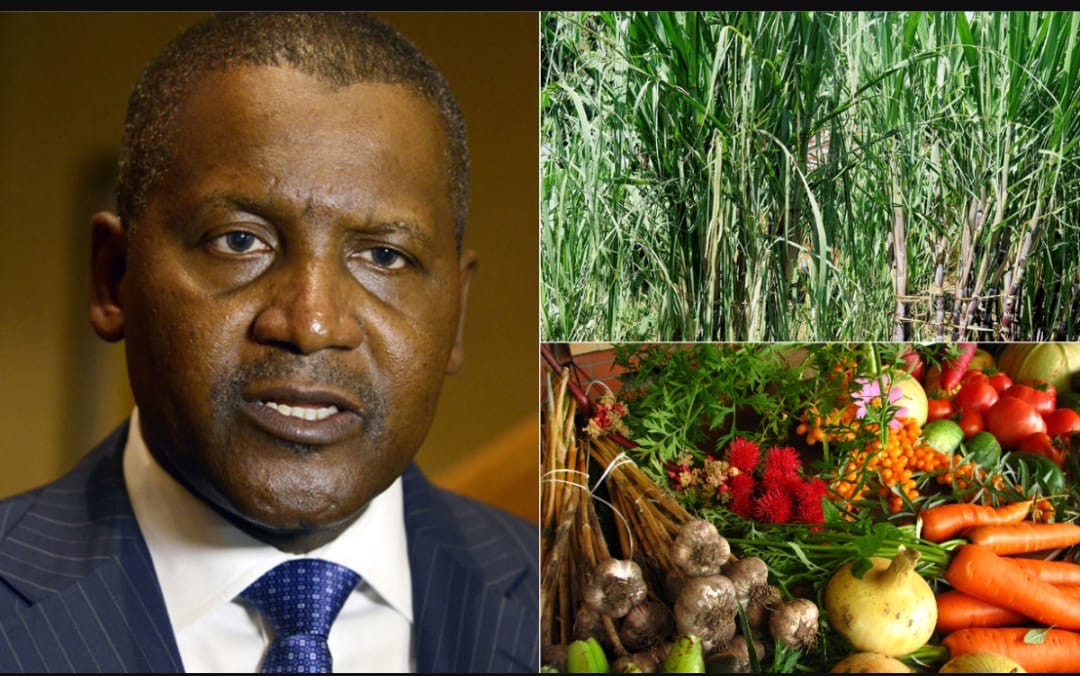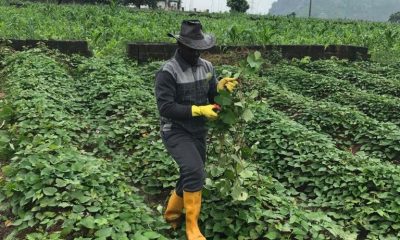Agriculture
Digital Technology, Agriculture and the Increasing Population

By Inyene Ibanga
Agriculture is going through a revolution. As the world’s population estimates increase from seven billion to ten billion by 2050, the demand for food and agricultural produce will certainly continue to be on the ascendance.
While demand for food is growing, the supply side faces the challenges of changing environmental and climatic conditions, dwindling water supply, shortage of arable land and farming inputs, the rapid rate of urbanisation thats reducing available land for agriculture, and a host of other problems.
To mitigate these challenges, farmers must continue to innovate and embrace digital technology to improve productivity to meet domestic and external demand.
Hence, the need for the transformation to digital or smart agriculture.Digital agriculture refers to practices that digitally collect, store, analyse, and share electronic data and information along the agricultural value chain.
It is the use of digital technologies, integrated into one system, to enable farmers and other stakeholders to improve agricultural production from the farm to the consumer.
Technologies such as mobile telephony, robotics, remote sensor technology, the Internet of Things (IoT), big data, artificial intelligence, and many others, provide the agricultural industry the tools and information to make more informed decisions and boost productivity.
Digital technologies can be part of the solution because they have the potential to provide farmers with the information and ability to address challenges and harness opportunities for growth.
Significant economic, social, and environmental benefits are delivered through the application of digital technologies, thereby transforming agriculture by offering new opportunities to improve efficiency, policy, and the performance of the agricultural value chain.
Digital technologies help to improve the traceability of agricultural products and increase value for farmers across the four main branches of livestock production, crop production, agricultural economics, and agricultural engineering.
For instance, the spread of mobile technologies and remote-sensing services are helping to improve the access of smallholder farmers to information, inputs, markets, finance, increasing productivity, while reducing operational costs.
The Food and Agriculture Organisation (FAO) reports that achieving the UN Sustainable Development Goal of a world with zero hunger by 2030 will require an urgent transformation of the current agri-food system.
The FAO notes that the next wave of technological efforts to sustain the fast-growing global population will leverage artificial intelligence (AI) and the Internet of Things (IoT) to improve the precision and sustainability of farming techniques.
For this reason, the global agri-food organisation, in partnership with the International Telecommunication Union (ITU), developed the E-agricultural Strategy Guide to assist countries in developing their national e-agricultural strategy and master plan.
Agricultural activities provides livelihoods for many Nigerians. These are important activities for the country’s economy after oil and gas. Between July and September 2021, the agricultural sector contributed almost 30 per cent of the total Gross Domestic Product (GDP) of Nigeria.
Although digital transformation has impacted key sectors of the economy, the same cannot be said about the agricultural sector. Sadly, the incessant insecurity in many parts of the country has worsened by the fare of farmers.
In the face of these challenges, the Ministry of Communications and Digital Economy, through its’ agencies, has introduced several initiatives to create opportunities that attract younger persons to gainfully engage in the agricultural ecosystem.
One of such initiatives is the recent partnership between the National Information Technology Development Agency (NITDA) and three federal universities in Nigeria to advance research into and the application of digital technology in farming to speed up the actualisation of the country’s food security.
The pilot schemes are slated to commence at the Federal University of Technology, Akure (FUTA), Federal University, Dutse (FUD), and University of Abuja (UNIABUJA), as part of the strategies to digitally transform activities along the agriculture value chain in Nigeria.
Speaking on the partnership, the Director-General of NITDA, Mallam Kashifu Abdullahi noted that the application of digital technologies in farming would reduce the quantity of water, fertilisers, and labour required, while also increasing yield and creating sustainable wealth.
“Using technology in farming will help the country optimise this sector, improve production, reduce waste, facilitate access to markets, and thereby put Nigeria on the path of food security and substantial income generation.”
The NITDA boss expressed optimism that digital agriculture would attract Nigeria’s younger population to farming and boost the country’s National Digital Economy Policy and Strategy to properly position a leading player in the global digital economy.
Agriculture remains a critical source for livelihoods and employment and the transformative power of digital technologies is bringing agriculture back to youths.
Additionally, the Nigeria Digital Agriculture Strategy (NDAS; 2020-2030) provides the policy direction for collaboration among key stakeholders in the agriculture value chain to boost domestic food security and gain access to global markets.
There is no doubt that digital agriculture is here to stay. So, NITDA should redouble efforts towards effectively bridging the digital divides by promoting rural digital literacy, gender inclusion, and the Nigerian Agricultural Platform initiatives as outlined in the NDAS.
Inyene Ibanga writes from Wuye District, Abuja; email: inyeneibanga@yahoo.com.
Agriculture
FG Empowers 9,870 Farmers with Inputs, Modern Rice Technologies in Kano

The Federal Government, through the Kano State Special Agro-Processing Zone (SAPZ) Programme in partnership with IFAD, has empowered 9,870 rice farmers in Kano with climate-resilient inputs and modern rice production technologies.
This was contained in a statement issued by the SAPZ Knowledge Management and Communication Officer, Rabi Mustapha.
The State Project Coordinator, Aminu Iliyasu, disclosed this on Sunday during the Farmers Field Day at Chiromawa Garin Babba Cluster in Garun Malam Local Government Area.
He said the exercise was organised to expose the farmers to Science-based and practical solutions capable of enhancing yields, improving food security, and boosting rural livelihoods.
Iliyasu described the field day as a celebration of knowledge, innovation and the resilience of smallholder farmers.
He explained that the SAPZ initiative in Kano aimed to expand access to improved technologies, strengthen extension services, reduce post-harvest losses and create market opportunities for rural farmers.
“These innovations are not theoretical. They are practical solutions that farmers can adopt immediately to raise productivity and increase income,” he said, while commending the support of local authorities.
Mustapha said the inputs distributed to 9,870 farmers included FARO 44 improved seeds, Urea and NPK fertilizers, and insecticides, targeting beneficiaries in Garun Malam, Gezawa, Bichi and Bagwai LGAs during the 2025 wet season.
She added that experts trained farmers on soil selection, seed dressing, nursery establishment, land preparation, and timely transplanting at proper spacing.
“They also covered fertilizer management, weed control, Integrated Pest Management and water regulation to boost rice yields.
“The training emphasised harvesting at optimal maturity, drying paddy to safe moisture levels, and fumigation using phostoxin to prevent storage losses,” she stated.
A beneficiary, Salamatu Ali, said the intervention had positioned Kano farmers to boost yields, withstand climate pressures and increase household incomes.
Another farmer, Huwaila Ibrahim, said the programme transformed her approach to rice production.
“Before, we planted without checking whether the land was suitable.
“Now, we first assess the soil to ensure it matches the seed variety. This season, we cultivated FARO 44,” she said.
Ibrahim added that her output increased from 20–25 bags per acre to about 40 bags after adopting the improved technologies.
Agriculture
FG Unveils National Agricultural Sample Survey, 2023 Report for Food Security

The Federal Government has launched the National Agricultural Sample Survey (NASS) 2023 report, towards developing data-driven policies to achieve food security and economic diversification.
Minister of Agriculture and Food Security, Sen. Abubakar Kyari, made this known at the launch of “Disseminating the National Agricultural Sample Survey (NASS) 2023 report” on Tuesday in Abuja.
“As a Ministry, we will apply these findings across the core levers of agricultural transformation, ensuring that our programmes remain data-driven, impact-focused and aligned with the aspirations of the Renewed Hope Agenda.
“A nation that measures well governs well. And food security begins with information security.
“This report should be seen as a practical tool for decision-making, one that guides policy choices, informs investment priorities and accelerates the reforms required across Nigeria’s agricultural sector.
“In a country of more than 232 million people, the strength of our food system depends on the quality of the data that guides national decisions,” Kyari said.
The minister explained that without credible evidence, interventions risk being misdirected and investments may fail to reach the areas of highest need.
The News Agency of Nigeria reports that Food and Agriculture of the United Nations (FAO) in collaboration with the Federal Ministry of Agriculture and Food Security, National Bureau of Statistics and the World Bank launched “Disseminating the National Agricultural Sample Survey NASS the 2023 report”.
He stated that the National Agricultural Sample Survey provides reliable, sector-wide data that helps the agriculture sector track production, understand emerging trends, and guide policy decisions.
Kyari added that the launch and dissemination of the National Agricultural Sample Survey 2023 represents an important step in ensuring that our national choices are informed, targeted, and grounded firmly in evidence.
“This report therefore represents more than statistical outputs; it reflects our commitment to transparency, disciplined planning, and the sustainable development of Nigeria’s agricultural sector.
“The findings of the National Agricultural Sample Survey 2023 present a clear and compelling picture of national production.
“The data we are presenting today is central to that mandate because it gives us the precision required to target interventions, close gaps, and drive the reforms needed to secure our nation’s food system.
“These data points also remind us that every figure reflects real activity across the country, from production to processing to marketing.
“With these digital foundations in place, insights from the NASS move from static data to operational intelligence, enabling a more transparent, efficient and connected agricultural system,” the Minister said.
The Director-General FAO representative in Nigeria, Dr. Hussein Gadain, said the NASS 2023 Report is not just a presentation of data but a celebration of collaboration, commitment, and progress towards building a stronger, more resilient agricultural sector in Nigeria.
Similarly, Adeyemi Adeniran Statistician General of National Bureau of Statistics (NBS) said that the NASS Report 2023 provides critical information on crop production, livestock, aquaculture, labour amongst all.
Adeniran who was represented by David Babalola an official of NBS said that data is essential for shaping effective policies and driving sustainable growth.
According to him, the survey also reaffirms the national bioscience commitment to upholding global best practices in data production through improved methodologies, enhanced field operations, rigorous quality data assurance processes and development of modern digital tools, in Nigeria.
Henry Karshima, Assistant Chief Forest Officer in the Ministry of Environment said that the role of agriculture cannot be overemphasised in food security especially with the launch of the survey.
Mr Abdulhameed Umar National Project Coordinator for Agro-Climatic Resilience in Semi-Arid Landscapes expressed satisfaction with the project in the line of restoring land degradation through data collection.
On his part, Asad Alam, the Senior Economist and Project leader 50×2030 Initiative World Bank Nigeria Development Data Group, Economic Division commended the initiative of making data a priority in agricultural activities to ensure food security.
Agriculture
Dangote Restoring Value to Agriculture, Sponsors 2025 Agric Show

By David Torough, Abuja
The Dangote Group has said that it is collaborating with strategic partners to revitalise and strengthen the agricultural sector of the Nigerian economy.
This development comes as the company sponsors the 17th National Agricultural Show, which opens on Tuesday, November 25, 2025, in Keffi, Nasarawa State.
The company’s spokesman, Anthony Chiejina, stated that expanding mechanised agricultural practices will play a critical role in boosting Nigeria’s GDP while creating meaningful employment opportunities for the country’s growing youth population.
“Through this partnership, the company aims to encourage greater participation in commercial agriculture and reinforce its role in advancing Nigeria’s economic growth,” he said.
He said the theme for this year’s Show: Employing Smallholder Farmers: Restoring Value, Ensuring Productivity will Ensure Attainment of Food Security in Nigeria, is apt.
Chiejina said: “Restoring the value of agriculture offers Nigeria more than nostalgic appeal; it provides a pragmatic route to economic renewal. With the right incentives and modern practices, agriculture can once again serve as a reliable engine of growth, anchoring jobs, stabilising markets and giving the economy a sturdier foundation.”
The Agricultural Show, a fixture in Nigeria’s agricultural calendar, offers a platform for showcasing innovation across the value chain.
The statement said the company is currently developing rice mills in Kano, Jigawa, Niger, Kebbi, and Sokoto States, with a combined total milling capacity of 1.5 million tonnes per annum.
It noted that the effort is intended to support the government’s broader push for food security.
The statement quoted the Senior Adviser to the President of the Dangote Group, Mrs. Fatima Wali-Abdurrahman, as saying that, in line with the company’s commitment to restoring value to agro-allied industrialisation in Nigeria, it is investing heavily in its backward-integration projects in the sugar sub-sector in Nasarawa and Adamawa States.
She said as part of its contribution to the agricultural sector, the company has a fertilizer complex in Lagos, located in the Lekki Free Trade Zone, with a production capacity of 3 million metric tonnes per annum of urea.
On the participation of the Dangote Group, Chairman, Board of Trustees (BoT), National Agricultural Foundation of Nigeria, organizers of the annual National Agric Show, Arc Kabiru Adamu, said: “Dangote Group has been our greatest ally from inception and we have enjoyed tremendous and invaluable support from them such that without them we will not be able to continue to hold the show efficiently.”
Adamu, who is also the President, All Farmers Association of Nigeria (AFAN) urged the Dangote Group to focus on agriculture, after its success in the oil and gas sector.
He added that: “This year we envisage a tumultuous turn out of farm machinery manufacturers, processors, researchers and youth and women farmers answering the clarion call to bolster Nigeria’s food system.”






























